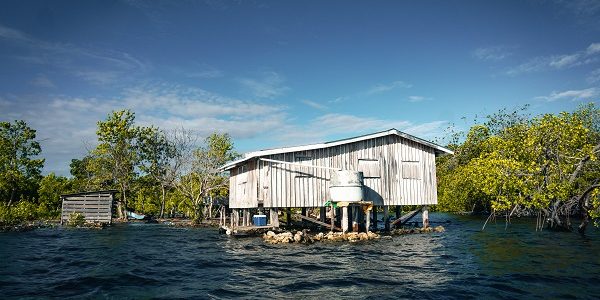Fishing village located opposite the Western Provincial capital of Gizo is battling the power of nature as its shorelines continue to submerge as a result of rising tide.
Families who have lived along this coastline for generations are confronting a harsh reality: rising seas are swallowing their land, forcing them to leave their only home and place of survival.
According to community elders, several families have relocated to higher ground, abandoning the settlement where their most precious memories were made.
They said the relocation began since 2021 as sea-level rise — driven by climate change — increasingly floods their coastal homes.
Some residents are choosing to build sea walls, but many feel powerless and are moving inland.

A visit by the Solomon Star to the settlement over the weekend revealed dramatic changes along the shoreline.
Rising tides have begun to reshape the very shape of the community.
Speaking to the paper, Tom Patterson, 42, a long-time fisherman from Lau Lagoon in Malaita whose parents moved to Gizo in the 1980s, said that while he knows well how the tides ebb and flow, recent years have brought something different, more dangerous.
“We noticed great changes in the tide,” he said.
As a result, Tom explained, one by one, families have abandoned their houses, leaving behind their blocks and relocating to safer, higher ground.
“This is due to the sea level rises that have reached the coastal line covering the flat land. The little community we had is now gone,” he said.
Other families remain, though their lives have been disrupted.

Raymond Samani, who still lives with his family by the coast, described how during abnormally high tides — especially “king tides” — water reaches their kitchen and cooking area, so sometimes they cannot cook their food on the stove located inside the kitchen.
“Luckily, our house is high, so the water only reaches the posts,” he said.
“But if things get worse, we will have to find another way,” Samani added.
“I will not leave my house until the situation is getting worse — this is our home,” he added.
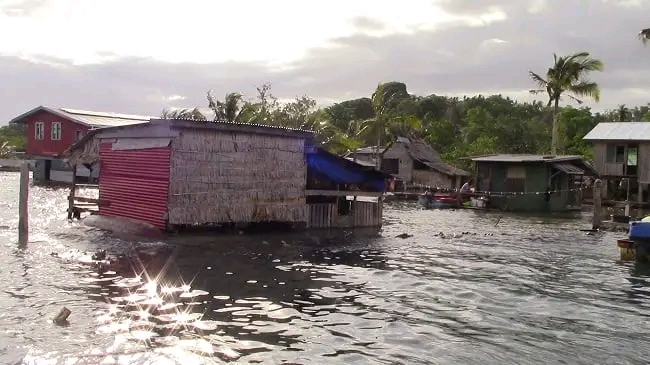
A father of one son reflected that while some may argue these changes are natural, humans also bear much of the blame for climate change.
He called on leaders, governments, and non-profits to stop pointing fingers and start working together to find solutions.
“Even our church building can be covered by water during the high and king tide,” he added — something that “we have never experienced before.”
He further added that their church building that is located just a few metres from the coastal line has also been affected by the lo king tide and continuous sea level rise.
“Sometimes when the king tide comes, the water would reach our feets above our leg during morning workshop and devotion on Sundays.
“As time continues, it is getting worse, the water can reach higher nearly reaching out knees,” Mr. Samani added.
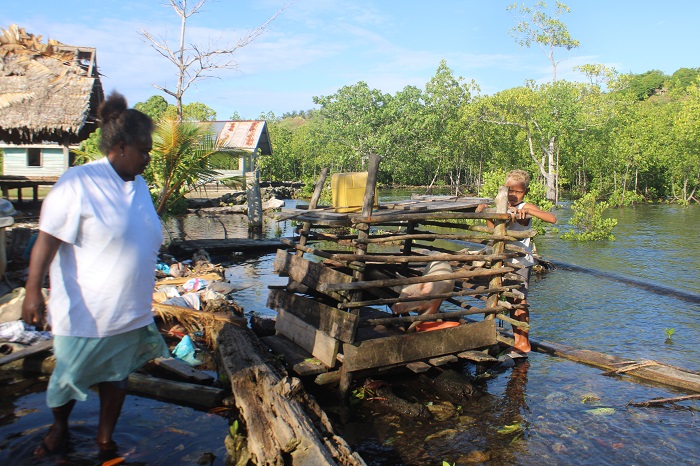
According to the statistics Fishing Village has a population of less than 2,000 people, largely composed of Malaitans from Lau Lagoon, who were resettled in the Western Province under the British Protectorate era.
With the coastal settlement under threat, many families are abandoning their homes for higher ground — but the relocation is complicated.
Much of the land around Gizo is government-owned, making legal relocation difficult.
Residents hope the authorities will help secure land through proper, lawful channels.

The plight of Gizo’s fishing village and other low-lying islands in the Western Solomons mirrors a broader, more urgent call being made at the 30th Session of the poolConference of the Parties (COP30) in Belém, Brazil: for global leaders to preserve the 1.5°C warming limit, which many Pacific Island nations say is their lifeline.
At COP30, Hon. Polycarp Paea, Minister of Environment, Climate Change, Disaster Management and Meteorology of the Solomon Islands, delivered a powerful intervention.
He declared: “The hour for climate action is upon us … for Solomon Islands, the 1.5 °C limit is non-negotiable — it is a matter of survival.”
Paea emphasized that the Solomon Islands are on the front lines of climate change — confronting loss, displacement, food insecurity, and erosion of culture and heritage.
He called on high-emitting nations to act swiftly, submit more ambitious climate pledges, and scale up grant-based, transparent, and just climate finance.
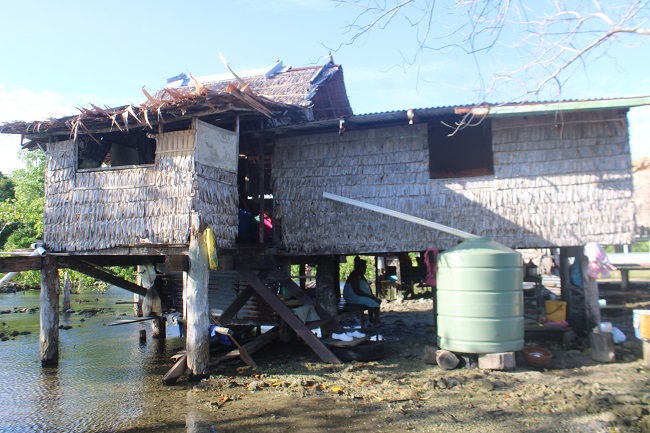
He also urged the world to fully support the Pacific Resilience Facility (PRF) — a Pacific-owned fund designed to help vulnerable communities build climate resilience.
Minister Paea framed climate finance not as charity, but “a legal, moral, and shared human obligation.”
Notably, Paea stressed that the ocean is central to the Pacific’s identity and survival: “As a Blue Pacific Continent State … we urge UNFCCC bodies to elevate the ocean–climate nexus to the highest level of priority.” Pina
Kiribati, a low-lying nation facing existential threats from rising sea levels, made its stance clear at COP30.
In Belém, Ms. Josephine Moote, Deputy Permanent Representative of Kiribati to the United Nations, appealed to world leaders: “The 1.5 target must be the scientific compass that guides all decisions … this is not negotiable for our future.” he said.
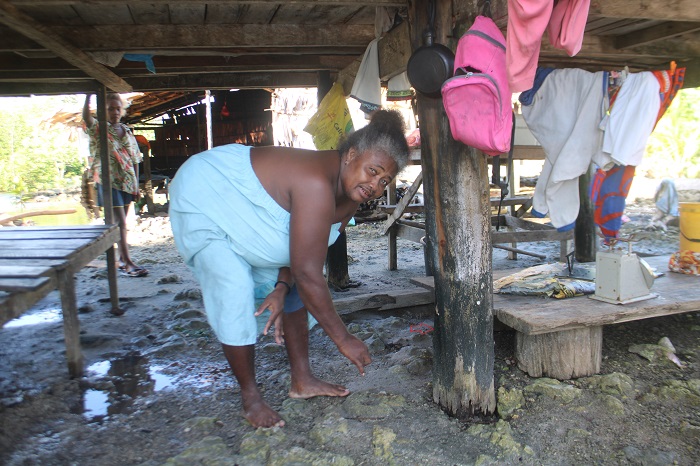
Ms. Vainalepa Toiata Apelu-Uili, lead negotiator for Samoa and the Pacific Small Island Developing States (PSIDS) in the Mitigation Workstream, echoed that sentiment, saying the fight to defend 1.5°C “will take political will and strong ministerial 1 … 1.5 degrees … is non-negotiable.”
Dame Jacinda Ardern, Special Envoy for Oceania at COP30 and former Prime Minister of New Zealand, has stood in solidarity with Pacific nations, supporting their call that limiting warming to 1.5 °C is a “fight for survival,” not just a policy ambition.
The flooding and sea level rise that threatens Gizo’s fishing village is a tangible example of what Pacific leaders are warning about on the global stage.
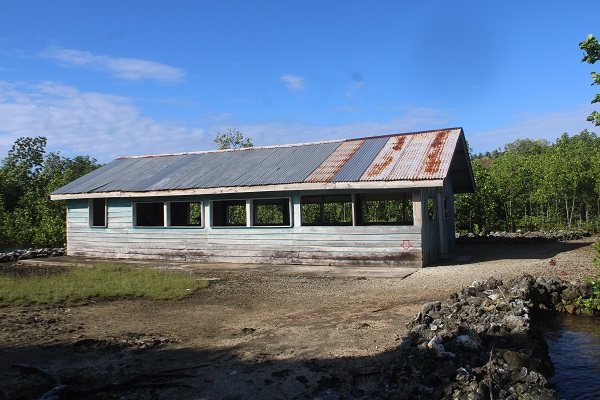
When island nations like Solomon Islands and Kiribati speak of “1.5 to stay alive,” they are not making political slogans — they are pleading for their communities, their way of life, and their future.
As world leaders negotiate in Belém for the past week the message is urgent: without strong climate action, with fair finance, and with a real commitment to the 1.5°C goal, places like Gizo risk being lost to the rising sea.
Meanwhile, Turkey has officially secured hosting rights for COP31, bringing an end to Australia’s campaign to stage next year’s global climate summit in the Pacific.
The outcome, announced after intense negotiations wrapped up at COP30 in Belém, Brazil, comes with a rare compromise arrangement that will see Australia play a central leadership role in steering the 2026 climate negotiations despite losing its hosting bid.
Pacific Island nations — long standing at the frontline of rising seas and intensifying climate impacts — have welcomed Australia’s continued involvement but say they will be watching closely to ensure their priorities are not sidelined.
Regional leaders have reiterated that the COP31 process must advance urgent calls for increased climate finance, a global phase-out of fossil fuels, stronger ocean protection measures, and sustained support for vulnerable island states whose future depends on keeping global warming below 1.5°C.
By Ulutah Gina
Solomon Star, Gizo
This story was produced as part of the 2025 Virtual Climate Change Media Partnership, a journalism fellowship organized by Internews’ Earth Journalism Network and the Stanley Center for Peace and Security.

